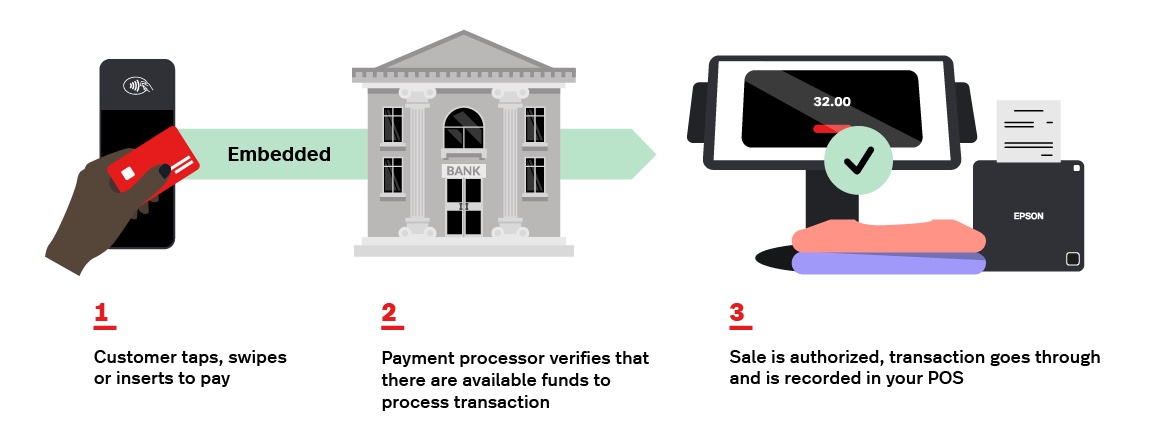
Labor shortages. Inflation. AI. If you work in retail, one or more of these things have likely kept you up at night—and for good reason. The retail industry is seeing massive shifts in technology, supply chain dynamics and consumer behavior. And when you mix in economic concerns like inflation and an unpredictable job market, you find yourself in a landscape that’s rapidly changing and difficult to navigate.
While there isn’t a one-size-fits-all solution for future-proofing a retail business, there are actions you can take to prepare for challenges and mitigate risk. And the first step is to look at the current trends and develop adaptive strategies.
To help you get ahead in 2024, we’ll delve into the key trends shaping the retail landscape and provide practical tips for navigating them.
- Offline retail is stronger than ever
- Increased AI adoption
- Technology helps retailers deal with ANY labor market
- Escalating retail crime
- Disruption in logistics and fulfillment
- Going beyond integrated payments
- Spending on services is on the rise
- Deals and promos are going strong
- Social commerce continues to gain traction
Prepare your business for the future of commerce
Download our free playbook and learn how to sell on different channels, boost loyalty and increase foot traffic with technology.
Offline retail is stronger than ever
There was a period during the ecommerce boom—and again, during the COVID pandemic — when people predicted the death of physical retail.
This take didn’t age well.
Here we are in the tailend of 2023, and brick-and-mortar stores are alive and well. So much so that Forrester expects offline sales to hit $4.2 trillion by 2028 and account for 72% of the total retail market.
And while ecommerce will continue to be a significant player, its growth will likely stabilize in the coming year. As the National Retail Federation (NRF) reports, “ecommerce levels peaked in April 2020 at almost 19% of retail sales. Since then, levels have dropped to 15%—higher than pre-pandemic but lower than the highest levels in early 2020.”
All this to say that the future of retail lies not in the death of one channel or the other, but in the seamless integration of both online and offline experiences. To thrive in the coming year, you must adopt an omnichannel strategy that leverages the strengths of both digital and physical retail.
To that end, make sure you use a retail POS and payments system that offers robust ecommerce features and/or integrations. Doing so will help you manage your multi-channel sales and operations seamlessly, providing a consistent experience for your customers.
Take, for example, the apparel retailer Loyal Tee, which uses Lightspeed to effectively connect their online and in-store inventory.
“With Lightspeed, I’m able to sync our in-store inventory with our online store. That really helps me reach online consumers. I feel confident that the inventory levels that I and my sales associates see on the POS and that customers see online are accurate. It’s super user-friendly,” explains Tori Erickson, founder of Loyal Tee.
Lightspeed’s ecommerce capabilities also enable you to fulfill orders with ease. Whether it’s through shipping, local delivery or in-store pickup, you can manage it all from one platform.

Increased AI adoption
When tools like ChatGPT became more mainstream in 2023, retailers and shopping platforms jumped on the opportunity to provide conversational commerce. The marketplace Mercari, for example, introduced a shopping assistant to help people find the right products. Similarly, the buy now pay later provider Klarna collaborated with OpenAI to offer curated product recommendations to its users.
While conversational commerce is a great use case of AI—one that we’ll likely see more of in 2024—we also expect to see AI being utilized in areas like inventory management, merchandising and other back office processes.
Walmart, for example, leverages artificial intelligence to predict inventory trends and strategically distribute stock across its stores. Meanwhile, Amazon uses AI and machine learning to spot and prevent fraud.
We anticipate these trends to accelerate in 2024 and beyond. And as AI becomes even more accessible, these features will democratize retail technology, making advanced capabilities like inventory prediction and fraud prevention available to all businesses, regardless of size.
Labor market uncertainty will need software solutions
Pinpointing solid labor trends is tricky because the job market is so dynamic. Some sources are pointing to a labor shortage while others suggest that the job market is cooling down. Your specific hiring situation will depend when your retail business is located and the markets that you serve.
Regardless of what the labor market will look like in 2024, technology will play a key role in ensuring your stores are staffed with the right people at the right time. From hiring new staff and scheduling shifts to training employees and setting sales targets, the right software will make your (and your team’s) life immensely easier.
Using tech to streamline your HR processes can make you more efficient and provide store leaders with new insights for a successful people strategy. McKinsey cites one example of a retailer that designed an app-based hiring tool to streamline the recruitment of store associates, significantly reducing the time and complexity of the hiring process
And once you have employees on board, a more robust system can get them up to speed and allow them to serve customers better.
Andy Linn, founder of City Bird knows this first hand, and says that having an easy-to-use retail management system like Lightspeed has improved his stores’ operational efficiency.
“Our staff loves using Lightspeed. It’s very intuitive. It’s easy to figure out just on your own, even without too much training, which has made it really quick for people to pick up,” he says.
Lightspeed’s easy-to-use capabilities ensure your team learns the software quickly so they spend less time tinkering with tech, and devote more energy to serving shoppers.
And with training mode, Lightspeed lets team members use the POS without affecting any of your store data. This feature is ideal for learning the basics of selling with Retail POS when first setting up your account, training staff or testing new features as they are released. All sales data processed in training mode is wiped when exiting and will not be recorded in your regular reporting.

Escalating retail crime
As far as the state of retail crime, the National Retail Federation (NRF) pretty much says it all:
Retailers are seeing unprecedented levels of theft coupled with rampant crime in their stores, and the situation is only becoming more dire. – NRF Vice President for Asset Protection and Retail Operations David Johnston
We don’t want to be the bearer of bad news, but the fact remains that retail crime—particularly in the form of theft—is on the rise. From increased incidents of shoplifting to the rise of flash mob robberies, the challenges facing retailers are becoming more complex and widespread.
Some of the largest retailers in the US are feeling these issues in their bottom line. CNBC reports that “Target lost about $219.5 million more to shrink during the three months ended July 29 than it did during the year-ago period.” Meanwhile, Dick’s Sporting Goods reportedly “lost about $27.1 million during the same three months.”
These trends aren’t showing any sights of slowing down. If you’re grappling with theft or inventory shrink in general, consider implementing stricter retail security measures such as:
- Enhanced surveillance systems, including CCTV and AI-powered cameras
- Advanced inventory tracking technologies, like RFID tags
- Employee training programs focused on loss prevention and recognizing suspicious behavior
- Tighter access controls, especially in high-value areas
- Collaboration with local law enforcement for improved security and rapid response. Implementing visible anti-theft signage to deter potential shoplifters
- Utilizing data analytics to identify patterns and hotspots for theft within the store Developing and enforcing stricter store policies regarding theft and shoplifting
While no security system is perfect, these practices can help curtail theft and ensure that your business stays secure.
Disruption in logistics and fulfillment
Drones could start delivering your orders in 2024, at least if Amazon’s plans pan out. The retail giant recently unveiled the MK30, a delivery drone that reportedly has the ability to deliver orders within 60 minutes of being placed.
MK30 will specifically support Amazon Pharmacy, enabling faster and wider access to medications.
While still in its early days, this update from the realm of drones signals a significant shift towards more efficient and rapid delivery services. And while the MK30’s specific application is in the healthcare industry, retail might not be too far behind.
Going beyond integrated payments

We can’t have retail and commerce without payments, which is why retailers should be smart about the payment providers they partner with. In 2024, we expect consumers to increasingly demand diverse, secure and convenient payment options, including mobile payments, digital wallets, and contactless payments.
As such, it’s important to use a payment processor that not only lets you accept multiple payment methods, but one that also works seamlessly with your POS system.
This is where embedded payments come in. An embedded payment processor is software that’s natively built into a platform’s existing suite of products to create a seamless checkout workflow.
Unlike integrated payments, which leverage integrations between a POS and third party payment processor, embedded payments have financial services built into the point of sale software.
This eliminates the need for complex integrations and simplifies the checkout process. Embedded payments can also reduce costs by eliminating the need for multiple vendors and fees.
Spending on services is on the rise
While physical goods are the bread and butter of retailers, offering services can help you tap into additional revenue streams and enhance customer loyalty.
The NRF is seeing strong spending growth in services, with service spending outpacing goods in 2023. In the same vein, Deloitte is forecasting consumer spend on services to increase 4.7% in 2024.
What does this mean for you?
If it makes sense for your business, consider adding services to your offerings. Are there any complimentary services that you can provide customers? Many jewelry retailers, for example, provide cleaning services to their patrons. Ditto with bike shops. It’s not uncommon for a bicycle retailer to offer repairs and maintenance in addition to selling bikes and parts.
If you’re using Lightspeed, adding services to your catalog is a breeze. You can create a service sale directly from the sell screen, so cashiers can take service sales as quickly and easily as traditional sales.

To track and manage the services you and your team are working on, just navigate to the Services page, which will show you all new services, as well as services that are ready to be worked on, or in progress. From here, you can update the status of each service sale, add notes or mark services as complete when they’re done.
Deals and promos are going strong
In 2024 we will likely see even more shoppers looking for ways to save money. A survey by EY found that consumers are “very concerned about the cost of groceries” and over a third (38%) are prioritizing affordability when choosing brands to buy from.
Research by eMarketer tells a similar story. Its 2023 survey of 1,669 US digital shoppers showed that consumers paid most attention to ads for products that are on sale. It’s also these types of ads that have led to the most purchases.
This tells us that in 2024, retailers need to consider value-driven strategies. Depending on your store, this could mean budget-friendly options and promoting sales and discounts effectively to attract cost-conscious consumers.
Of course, deals and discounts aren’t always a good option, particularly if you’re in the high-end market. If this is the case, then implementing smart purchasing processes is essential. It’s also important to leverage data in your decision-making, to ensure that you’re stocking the right products, targeting the right customers and operating in a way that maximizes profitability.
Social commerce continues to gain traction
Statista forecasts the global revenue of social commerce to surpass six trillion U.S. dollars by the year 2023.
Consumers are increasingly using social platforms to browse for inspiration, discover brands and ultimately make purchases. So, make you have a strong presence on the social platforms that your target audience frequents.
And if you haven’t done so yet, experiment with different social commerce features. Instagram, for example, has integrated shopping tabs and product tags that facilitate easy browsing and purchasing within the app.
Meanwhile, TikTok has been leveraging its massive user engagement through shoppable videos and partnerships with ecommerce platforms, offering unique ways for brands to connect with consumers.
Explore these capabilities and see what works best for you.
Keep up with these retail trends and prepare for the future
The future of retail is bright for customer-centric merchants who are continuously leveling up their operations and finding ways to do better with less.
At Lightspeed, we’re committed to serving ambitious retailers who want to succeed and thrive—now and in the future. Watch a demo of Lightspeed and discover why thousands of retailers choose our platform to run and grow their businesses.
FAQs
What are the trends in retailing?
The retail industry is undergoing a period of significant change, driven by factors such as the rise of ecommerce, changing consumer behavior, and technological advancements. Some of the key trends in retailing include omnichannel retail, AI, social commerce and more.
Why are retailers struggling?
Consumers are becoming more demanding and are constantly looking for new and innovative products. Retailers that don’t innovate fast enough will struggle to keep up. There’s also the issue of increased competition. The retail industry is becoming even more competitive, with new entrants emerging all the time. Finally, there’s economic uncertainty. The global economy is facing a number of challenges, such as inflation and supply chain disruptions, which is putting pressure on retailers’ margins.
What do customers want in 2024?
In 2024, customers will continue to seek retailers that sell great products at reasonable prices. Modern shoppers also demand a seamless and personalized shopping experience. And many cases (particularly younger generations) are looking for retailers that are committed to sustainability and social responsibility.
Is the retail industry growing or declining?
The retail industry is expected to continue to grow in the coming years, driven by factors such as population growth, increasing disposable income, and the rise of ecommerce.

News you care about. Tips you can use.
Everything your business needs to grow, delivered straight to your inbox.


